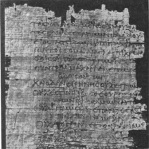From Psalms 74-77
 Today’s psalm invites the reader to join with others that, in the teeth of seemingly overwhelming evidence, God will judge and set right the horrible endemic evil in human existence.
Today’s psalm invites the reader to join with others that, in the teeth of seemingly overwhelming evidence, God will judge and set right the horrible endemic evil in human existence.
This post is part of my bible in a year series.
Passage and Comments
The Psalmist begins with Judah, Israel and Zion. He describes the glorious battles of the LORD.
1 In Judah God is known; his name is great in Israel.
2 His abode has been established in Salem, his dwelling place in Zion.
3 There he broke the flashing arrows, the shield, the sword, and the weapons of war. Selah (Ps 76.1-3)
‘Salem’ is an ancient poetic name for Jerusalem (cf. Gen 14:18). Zion is the mount within Jerusalem. The LORD is omnipresent, however the statements locate the presence and majesty of the LORD with his people in Israel.
The Psalmist begins to give reason for why his name is great and his abode established. His military victories.
4 Glorious are you, more majestic than the mountains full of prey.
5 The stouthearted were stripped of their spoil; they sank into sleep; all the men of war were unable to use their hands.
6 At your rebuke, O God of Jacob, both rider and horse lay stunned. (Ps 76.4-6)
The LORD is glorious and majestic. More so than the ‘mountains full of prey’.
Mountains convey strength and immovability. So is the LORD.
The Psalmist continues to describe the LORD’s military victories over his enemies. Its not clear which of the LORD’s victories the Psalmist describes. The omission of water may suggest the victory over Egypt in the Red sea may not be in mind.
7 But you, you are to be feared! Who can stand before you when once your anger is roused?
8 From the heavens you uttered judgment; the earth feared and was still,
9 when God arose to establish judgment, to save all the humble of the earth. Selah (Ps 76.7-9)
The Psalmist describes the sheer power of the LORD. None can stand against him once he is angered. The description mention the heavens and the earth. The LORD is God over all creation.
When he acts in judgment and anger he does so in order to protect the humble of the earth from the wicked.
10 Surely the wrath of man shall praise you; the remnant of wrath you will put on like a belt.
11 Make your vows to the LORD your God and perform them; let all around him bring gifts to him who is to be feared,
12 who cuts off the spirit of princes, who is to be feared by the kings of the earth. (Ps 76.10-12)
The translation and meaning of verse 10 is difficult. The verse suggests the LORD works through people to fight his battles.
The ‘wrath of man’ shall praise him. Those he uses in his wrath shall praise him and glorify him as LORD. ‘The remnant of wrath’, the term ‘remnant’ normally describes a group of people the LORD has reserved for himself. He ‘will put on like a belt’. Quite often the clothing imagery describes how a person acts and behaves. Again the LORD is working through people to defeat his enemies.
The Psalmist ends exhorting the people to fulfill their vows to the LORD and bring him gifts in thankfulness. They should do this because God is mighty and destroys the powers of this world. Princes and Kings of the earth alike.
Story of Israel

“Ps 76 does not specifically refer to Yahweh as ending war or to the age when “nation will not again go to war against nation, neither will they learn war any more” (Isa 2:4). Still, it is clearly the intent of the psalm to show that warlike powers are helpless before Yahweh, who delivers the poor and whom all kings will fear. The OT seems to say more about war than about peace, but it always sees peace as Yahweh’s goal. Its visions of the age when Yahweh’s will is brought about on earth include a peaceful world worshiping him (Zech 14:16; Isa 11:6–9), and one of the generally accepted titles of the messiah is “Prince of Peace” (Isa 9:6).” (Tate, M.E., 1998. Psalms 51–100, Dallas: Word, Incorporated.)
Story of Jesus
The Psalm certainly encourages us to be on the LORD’s good side. It refers to salvation and judgment. In the gospel, Jesus came to save. When He returns He will judge.
44 And Jesus cried out and said, “Whoever believes in me, believes not in me but in him who sent me. 45 And whoever sees me sees him who sent me. 46 I have come into the world as light, so that whoever believes in me may not remain in darkness. 47 If anyone hears my words and does not keep them, I do not judge him; for I did not come to judge the world but to save the world.
48 The one who rejects me and does not receive my words has a judge; the word that I have spoken will judge him on the last day.
49 For I have not spoken on my own authority, but the Father who sent me has himself given me a commandment—what to say and what to speak. 50 And I know that his commandment is eternal life. What I say, therefore, I say as the Father has told me.” (Jn 12.44-50)
Have you been saved by Jesus? Will you be judged by him?
The Psalm finishes with an exhortation to fulfill our vows [promises] to the LORD and give him gifts because he is to be feared. What could this look like for you?
Copyright © Joshua Washington and thescripturesays, 2016. All Rights Reserved.




